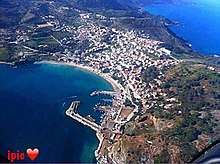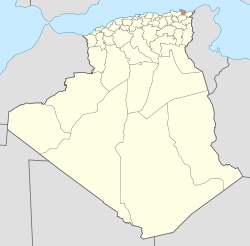Chetaïbi

Chetaïbi (شطايبي) (formerly Herbillon) (also known as Ceṭṭaybi) is a small fishing port in Annaba Province, Algeria located at 37°03′58″n, 7°22′49″e approximately 70 km in the west of Annaba.
Geography
The commune of Chetaïbi is located about 62 km northwest of the wilaya of Annaba: it has a fishing port. The main beaches are: Chétaibi, The Golden Sands, Oued Leghnem, Roman Fountain, The West Bay and Sidi Akkacha.
The population of the town is 8035 at the 2008 census.[1] and the postal code is 23014.
Gallery
 Chetaibi village
Chetaibi village Chetaibi vue Aerienne.jpg
Chetaibi vue Aerienne.jpg Chetaibi.jpg
Chetaibi.jpg Village chetaibi.
Village chetaibi.
History
During the Roman Empire there was a Roman town called TACUATA and ruins of the town are still to be seen. Tacuata was a relatively important city. It was in Roman times also the starting point of a road to the west, marked by Muharur (Sidi akkacha), zacca (Cape of iron) and red porphyry was exported to Rome by the port at Seybouse; Culucitanis (the Marsa) and paratienis (Guerbes).
With the Muslim Conquests of the Marghreb the Arabs had made the town now known as Tekkouch after the Teccuche Berbers, their own.
In the middle ages several places along the shore attracted various legends from the neighboring peoples . These legends were for cultural purposes and perform mystical courses. The forest which is extensive in this part of the coast, is the object of a lively admiration with a very rigorous asceticism in which it is still the flowering of a greater number of mausoleums that are places of all kinds of rejoicing with the participation of brilliant fantasia as in Sidi Boufernana every year; To illustrate its merits and give way to a family relaxation.
In 1830, during the siege around Annaba, the two years of uncertainty of the first battles, a clandestine movement of a flotilla came every night from Tekouch to supply the inhabitants of the city with all kinds of provisions. At that time, a historical event of great size was not lacking in certain interest and deserves a precision: since it is there, even in the Edough, where its maquis has preserved in the mountains the memory of the revolt of If Zeghdoud. From a family of scholars bearing the name of Oued Jemaoune, he was born in Souk el had (or Ain oum elrakha at the moment) against the occupier although dating from the first day gained in magnitude in June 1841 refugee to Sidi Akkacha.
At the end of the 19th century, Tekouch took the name of the French general Herbillon and at the time when the Caramy was transporting passengers enter Bone and Herbillon, the first doctors to have practiced there were Drs Bendjelloul and Monpére.
After Algerian independence the town was renamed Chétaibi.[2]
Description
A country of fishing, Chétaibi is also a very game hunting country. The beaches and sea baths certainly have more attraction in Chétaibi than anywhere else. Even from the tourist point of view, it could be a village of certain future and may be, closer than we think. At the foot of the mountain, there are superb beaches bordering the shore and enchanting corners: the Roman fountain, Oued Ghnem, the western bay, the golden sands, Kef Omar (holy piastre island); . . . ; Which are very fishy places.
There is also the port of Chétaibi (e.g. Herbillion) which seems to slumber at the bottom of a small bay entrance of high mountains of marvelous granite, the most beautiful and the hardest one can be seen. The exploitation of the quarries of Chétaibi was for a long time the fortune of this center, which seemed to have no other activity than that of fishing. Many large cities in France (Paris, Marseilles, etc.) and even elsewhere (Rome, the paving stones of which they have lined the streets of their streets).[3]
References
- ↑ [PDF]Recensement 2008 de la population algérienne, wilaya d'Annaba, sur le site de l'ONS. [archive].
- ↑ Docteur A.FRIHA, « Histoire de Chetaibi » [archive] (consulté le 31 mai 2016) Archived 2014-01-14 at the Wayback Machine..
- ↑ Docteur A.FRIHA, « Histoire de Chetaibi » [archive] (consulté le 31 mai 2016) Archived 2014-01-14 at the Wayback Machine..
External links
- (in French) Chetaïbi
